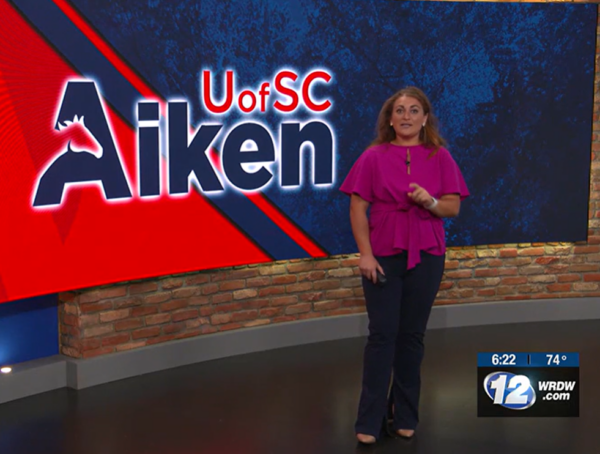Tai Takahashi, a University of Kansas alumnus, has served as the news director for WJTV 12 in Jackson, Mississippi since December 2018. Takahashi spoke with University of Mississippi journalism graduate student Jared Redding about hiring sports reporters, the sports TV industry and advice for those looking to get into the field.
Redding: With young journalists that are interested in sports reporting, what would you tell them about job prospects?
Takahashi: Sports broadcasting tends to be one of the most popular things that people aspire to do. I mean, they grow up watching and playing sports, etc, etc. So, it’s no real big surprise. Yet, those jobs are kind of few and far between, but it doesn’t mean that you can’t find something, you can. But I would say don’t be afraid to take an MMJ role.
Storytelling is storytelling. If you’re a good storyteller for news, you’re going to be a good storyteller for sports. You apply the same principles, so don’t limit yourself. Find mentors where you can. Use any advantage you might have going in. If you have an internship somewhere, it’s very plausible that you would be able to slide in if you’re able to impress somebody enough at that level.
Redding: With WSVN in Miami recently saying it was doing away with sports in the newscast, do you think this is a sign of things to come across the industry?
Takahashi: No. That’s not a new trend. I cracked into this business in 1990. People were talking about it then. The thing is, it really depends on their priority and their vision for sports at that level. For instance, our company preaches hyper-localism. There’s nothing more hyperlocal than local sports.
The thing is, as long as you keep it local, and keep it off the national headlines, you’re offering something unique to your local audience that they wouldn’t otherwise get from ESPN or any other national entity. So, I don’t think it’s dead. It’s really how you play it and how sports plays in every market. A lot of those discussions are research-based. They’ll say that research shows that sports registers last on the list of reasons why people tune in to local news. Although that may be true, local news registers as one of the top three. So, what’s that tell us? Basically, it tells us that there’s an appetite for localism, but there’s not an appetite for sports in the broad sense.
Redding: When there’s an opening for a sports reporter or anchor, what helps a candidate stand out in a positive way?
Takahashi: What I’d want is to hear or see examples of sports journalism, as opposed to regurgitation of highlights. I want to see storytelling, I want to see good videography and something that tells me that you’re a journalist above being a sports broadcaster or a talking head on news.
The packaging part is very important, and then you’ll also want to show me that you’re a good writer. If you’re playing your cards right, some of the best news anchor candidates actually come from sports because they’re natural on camera. They get the localism part. They ad-lib well. That’s something that they don’t really teach you on the news side. In sports, you have to have that, so all those come into play.
Redding: What are some of the biggest mistakes a job candidate for a sports-related job can make?
Takahashi: Just showing me that you can regurgitate sports highlights doesn’t interest me. If you say that you’re only interested in sports and not news, then that won’t interest me either. The reason for that is… local sports is news, and local news can be sports. So, if you come in saying the only interest you have is highlight-driven sports, then you’re gone, you’re out.
Redding: If you don’t mind sharing, what was one of the toughest things that you’ve ever had to deal with on the job itself? And if someone else were to wind up in that position, what advice would you give them to help them get through certain situations?
Takahashi: This could be somewhat of a long-winded answer. Because everything presents a different, unique challenge. For instance, in the sports world, a lot of sports anchors believe that their role is to be an ambassador, kind of a cheerleader to sports divisions, and they don’t want to touch hard news.
There was a case about 15 years ago where a prominent basketball player was implicated in a sexual assault. The sports director didn’t want to touch it. The other layer of that was that the victim was coming forward and being very public. All the other stations reported the victim’s name. So, we were kind of faced with, ‘When do we cross that ethical boundary?’ The name is out there. The charges are out. At what point do we report the victim’s name? Or do we just stand our ground and not do anything? Does that make us look good or bad? It’s that type of decision. That was very difficult. Tell you the truth, I can’t remember off the top of my head what we decided. But I believe in that case, we stood our ground and decided not to report the name and said, ‘Well, you could get the name from other places. But this is our ethical policy.’ And we articulated that to the audience.
From a news director’s perspective, you deal with all sorts of things. Getting facts wrong, how do you handle that? How do you handle legal cases? Threats of lawsuits? It doesn’t happen too often, but when it does, it always involves a number of discussions that you have to have with not only your supervisors, but people who are involved in the decision-making process.
Redding: If someone is going into TV sports reporting for the first time professionally, despite having plenty of college training, how do you and the staff go about making sure that it’s a smooth transition? What leadership style helps them succeed the most?
Takahashi: There really is no magic bullet. It depends on the individual, what they respond to. What I found works best is peer mentors, people who’ve been through it before. If they’re willing to listen to that individual, then that makes a better partnership than boss to subordinates, so to speak. Yet some others will latch on to me and ask me for constant feedback, saying give it to me straight and tell me how to fix it if there’s a problem. It really depends on how that individual responds to various types of coaching. You kind of have to identify that early on.








